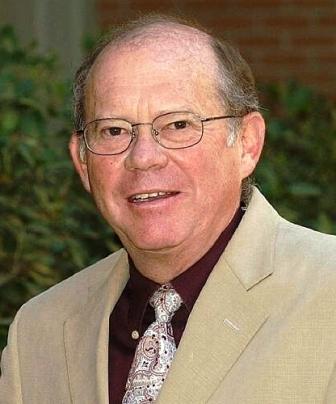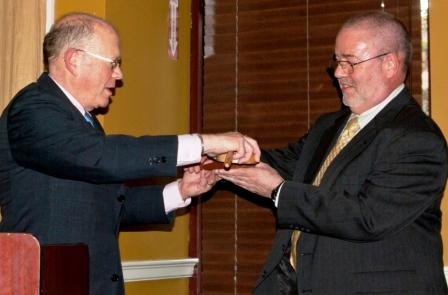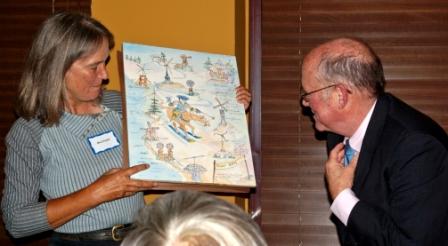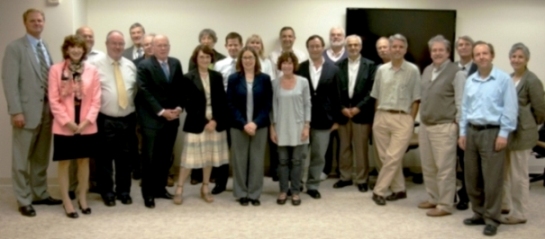August 2011

NOTES FROM THE ACADEMIC SENATE CHAIR
DANIEL SIMMONS
Dear Colleagues,
As my term as Academic Senate chair comes to an end, I want to share some thoughts with you about where we have been and where we are going as a faculty and a University. It has been an extraordinarily difficult year to serve as Senate chair. UC faces hard choices that may lead to fundamental changes in its very nature. The Senate has struggled with the impact of those choices on our core mission, and with challenges to our confidence in the future of our University.
Since the beginning of my term as vice chair two years ago, I have watched the President, the Regents, and my colleagues in the Senate leadership come to full recognition of the fact that the trajectory of State funding is on a long-term decline. Notwithstanding President Yudof’s tireless efforts to craft a five year agreement with Sacramento, I think it is in UC’s long-term interest to recognize that we can no longer count on California’s political leadership to make higher education funding a priority, and plan accordingly. The fundamental choice we face now is to replace lost State funds with higher tuition or to undercut our investment in high quality teaching and research.
Over my two years as faculty representative on the Board of Regents, I have continually advocated that our first priority must be to maintain the teaching and research excellence of the University—in essence, the quality of the faculty—over affordability and access, the other two key pillars of our strength. We may lose the historic low cost access to higher education promised in the California Master Plan, but the Governor and the legislature can restore funding for access and affordability when the people of California again recognize the connection between access to educational excellence for the State’s top students and the State’s long-term economic health. On the other hand, if UC loses its excellence and prestige through the loss of its world class faculty, we will not recover. While it is easy to recognize that costs are rising for students, the decline of faculty that will result from failing to maintain competitiveness will be discernable only slowly and not before it is too late to recover.
 |
Senate Chair Dan Simmons passes the Chair’s gavel to Vice Chair Robert Anderson at the Academic Council Dinner, July 27, 2011. |
This year’s Academic Council was an extraordinarily talented, dedicated and experienced group of senior faculty who are well aware of the issues and choices before us. I called a special Council meeting at the end of June to discuss the Senate’s response to the $650 million state budget cut for 2011-12. The administration had not yet made a decision about tuition increases, and I felt it was important for the Senate to go on record. There was a very short window for comment, so our choice was to act quickly or to remain silent. Council’s resolution advocated replacement of this last round of cuts with an equivalent tuition increase. It reflected our recognition that the University has been backed into a corner and has no choice but to replace the loss of State support with higher levies on the students who directly benefit from a UC education. Council’s position was communicated to the Regents, who came to the same realization in their adoption of President Yudof’s recommended tuition increase.
As you know, the Senate sometimes struggles to work through competing views to fully resolve issues, particularly when it is facing decisions that involve conflicting faculty and campus interests. This task is even more difficult today, when the issues and choices before us involve diminishing resources, and a decision in one direction will inevitably cause pain in another.
I am aware that there are faculty who believe the Senate should uphold access and affordability as our most important values, and others who say that UCOP is simply not working hard enough to convince the legislature to increase our budget. First, make no mistake—the Academic Senate remains deeply committed to access and affordability. So far, UC continues to be relatively affordable to low income families through the Blue and Gold Opportunity Plan, and we have maintained enrollment levels that provide access to the top 12.5% of California high school graduates. However, that may change, and I fear the growing burden on middle class families may spark a backlash against return to aid, because maintaining both access and excellence requires that we increasingly fund the institution on the backs of the middle class.
Second, I watched UCOP undertake a valiant effort this year to resist the state budget cuts. In addition, many in the Senate leadership, along with our counterparts from CSU and the Community Colleges working together through the Intersegmental Committee of the Academic Senates (ICAS), devoted substantial time to lobbying efforts in Sacramento to stress the importance of public higher education to the long-term future of California. Unfortunately, our state leaders have not shown a willingness to elevate higher education over other public sector priorities. As a result, I think the State budget allocation to higher education will continue to shrink. UC must begin to rethink the way it plans and does business so that we can move forward rather than simply maintain the status quo.
Given President Yudof’s propensity to move quickly on issues, it is important that the Senate be willing to respond rapidly, which means that in some instances faculty will need to rely on their elected leadership to exercise judgment on their behalf. Moreover, no one should be surprised when the Senate and administration arrive at the same conclusion about difficult decisions. In fact, one of the Senate’s strengths is that we work in partnership with the administration to guide the University. President Yudof is more open to listening to the views of the Senate than any UC president I have worked with. I have witnessed many occasions over the past two years when he has thoughtfully considered and responded to Senate views – on furloughs, budget issues, faculty salaries, post-employment benefits, among others. Nonetheless, the administration is considering ideas that may not be in the best interest of the University, so the Senate must remain active and vigilant.
The post-employment benefits (PEB) debate over 18 months is a good example of the Senate’s contribution to University policy. The Senate was influential in formulating the final result, and Senate faculty, particularly in UCFW’s Task Force on Investment and Retirement (TFIR), brought critical knowledge to the discussion that would have been absent otherwise. TFIR also made a major contribution by pushing the idea of borrowing to address UCRP’s unfunded liability, and the Senate endorsed CFO Peter Taylor’s opinion that it would be better for UC to borrow from the Short Term Investment Pool than from external sources. This level of informed engagement and collaboration typifies the Senate’s work on a wide range of issues, and it is why the Senate is so important to the University. The PEB work also highlighted the importance of maintaining a strong working relationship with the staff organizations and advisors to the Regents, who were major allies in protecting post-employment benefits for all UC employees.
The Senate also had a significant voice in debates about proposed policies for self-supporting programs, professional degree fees, and the necessary role of CCGA with respect to a policy for approving conversions of programs to self-supporting status. It is important for the Senate to exert its authority in these areas, as graduate programs slowly shift to a more privatized model.
The Senate made progress on efforts to deal with online education programs and what the campus approval process for courses involved in the online education pilot project should look like. I encourage all Senate entities to remain engaged with this issue as we navigate unfamiliar territory over the next two years. The Senate’s position is clear that approval for UC credit-bearing courses rests with courses committees on each campus, and courses are the responsibility of faculty appointed by and acting through academic departments.
We also made progress in easing transfer, working with the Provost to convene seven UC transfer “streamlining” groups who met at UCOP to explore commonalities in lower division major requirements in similar departments across campuses. These sessions demonstrated a significant degree of commonality of expectations for lower division major preparation across campuses.
 |
Senate Chair Simmons inspects “Dan Quixote”, a painting celebrating the chair’s achievements, presented by artist Mary Powell at the Academic Council Chair’s dinner, July 27, 2011 |
Council endorsed most of the recommendations articulated in the report of the Academic Council Special Committee on a Plan for the University of California, as well as the 23 recommendations of Council’s Implementation Task Force, which has proposed a new methodology for allocating state funds to the campuses based on undergraduate enrollment. These recommendations will make it easier to track fees retained by campuses under Funding Streams. There have always been campus “winners” and “losers” in terms of state fund allocations, but cross-subsidies and complex funding mechanisms have made this difficult to track. The ITF report provides a rational and transparent methodology for disclosing the flow of state funds, and I expect the President’s Budget Rebenching Task Force to take these recommendations seriously when it resumes work in September.
The most important role and responsibility of the systemwide Senate is to maintain values that promote the excellence of the faculty on all ten campuses, but it is becoming more difficult for us to fulfill that responsibility. At all levels of the University I see faculty and administrators focusing on what is best for their campuses, rather than what is best for the system as a whole. To avoid the cataclysmic dissolution of UC into ten separate and competing universities, we must maintain a strong focus on building the excellence of all ten. To do that, we must continue to hire top young faculty and support them throughout a career. This philosophy motivated the Senate to call for maintaining the defined benefit plan in the PEB debate and for maintaining the peer reviewed salary scale at competitive levels. The University of California built its greatness from the bottom up, not by hiring superstars in what some administrators deem “emerging fields.” We must hire good young faculty and allow them to explore freely, knowing that some explorations will result in the development of tremendous strengths that are not always predictable.
Some Regents and administrators believe they can solve the budget problem simply by restructuring the academic enterprise to make it more efficient and cost effective. While there are always things we can do to improve efficiency, UC was built over the course of 142 years; we cannot simply turn it on a dime based on the next “great idea.” In fact, almost all of today’s ideas for efficiencies were also debated in the 1990s, when we were dealing with severe budget cuts during my first term as Senate chair. Many of those ideas are no more effective today, which is why so few of them survived.
We also must be careful not to let the medical center enterprise overwhelm the University’s research and undergraduate teaching mission. One idea worth exploring is to combine all the medical centers into a single University owned Limited Liability Corporation with a single CEO and a board of directors appointed by the Regents for their expertise in running medical centers. The medical center could contract with the UC medical schools and other clinical practice groups for physician services, an approach that could help separate clinical compensation plans from academic appointment and salary. Such a structure would make the medical centers responsible for their own losses and allow them to pay competitive salaries to administrators, but those salaries would directly affect their bottom line. You could base choices on what would be required to have competitive health care institutions in California rather than five separate competing entities.
In our blogosphere world, where Twitter-sized messages and PowerPoint presentations substitute for in-depth analysis, it is becoming more unusual for people to take the time to study issues and understand the compromises required to resolve them. But deep analysis of issues is what the Academic Senate does and is why it is so valuable. I believe the Senate is unmatched as a place for vigorous, high level debate by informed participants about issues that are critically important to the whole of the University. Indeed, the most rewarding thing about serving as chair of the Senate is the opportunity to work with an amazing collection of interesting, intelligent, and diverse individuals.
The past two years have been a rollercoaster ride that I would not trade for the world. As I finish my term, I am more worried about UC than I have ever been in my 35-year career. At the same time, I am hopeful that we will get through. But to help the Senate, President, and Regents make decisions that maintain UC as the best in the world far into the future, the faculty of the University must step up and get involved, locally and systemwide. I urge you to volunteer for Senate service to help shape the future of your University.
Fiat Lux, Dan
 |
2010-11 Academic Council members pose with Senate staff and Senior Administrators. From L: Nathan Brostrom, Fiona Doyle, Robert Powell, Robert Anderson, Lawrence Pitts, James Carmody, Daniel Simmons, Manuela Martins-Green, Martha Winnacker, Todd Giedt, Elena Fuentes-Afflick, Mary Gauvain, Ahmet Palazoglu, Susan Gillman, Evan Heit, James Chalfant, Phokion Kolaitis, Joel Dimsdale, Frank Powell, David Kay, Bill Jacob, Henning Bohn, Ann Karagozian
|
